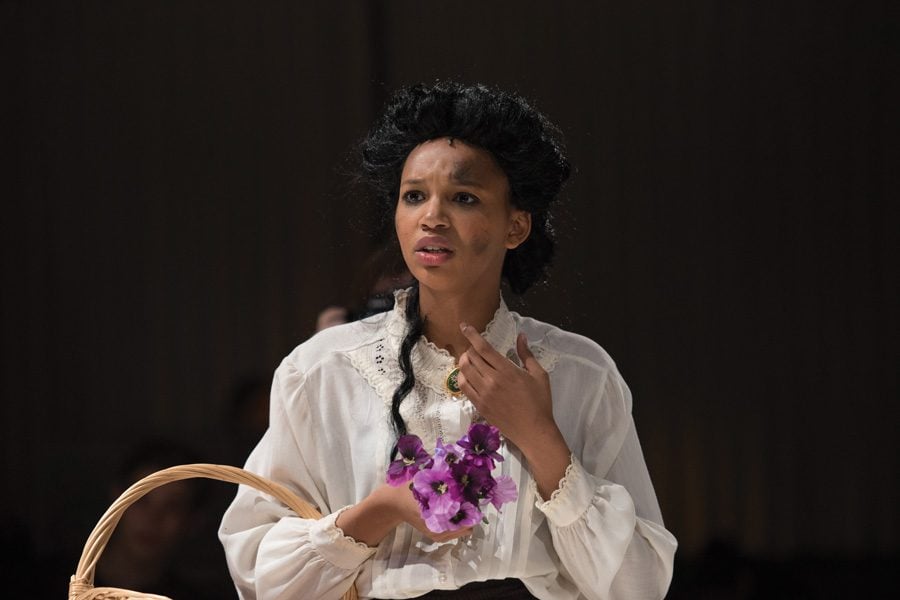Wave Productions highlights social tensions with modest take on Golden Age musical
Katie Pach/Daily Senior Staffer
Kaja Burke-Williams plays Eliza Doolittle in Wave Productions’ performance of “My Fair Lady.” The show, which emphasizes ideas such as classism, feminism and identity opens Thursday in the Norris University Center Louis Room.
February 9, 2017
A new production of “My Fair Lady” hopes to speak to students throughout campus and touch on timeless issues in a scaled-back setting.
Wave Productions’ version of the classic Broadway show raises questions on issues including classism and feminism, director Danny Kapinos said.
The musical, which will debut Thursday in the Louis Room at Norris University Center, follows the story of Eliza Doolittle, a flower girl taken under the wing of an elitist phonetics professor. The professor’s grueling elocution lessons stifle Eliza’s cockney accent and transform her into a duchess.
Eliza changes her mode of speech, dress and behavior to fit in, illustrating how class can impact identity, said Kapinos, a Communication junior.
“We’ve zeroed in on whether transformation relies on erasure of the past self,” he said.
Eliza’s story illustrates the tension between societal pressures and personal freedom. Kaja Burke-Williams, who plays Eliza, said she feels a responsibility to express this conflict through her character’s personal journey.
“Eliza’s speech patterns don’t allow for respect or understanding at the beginning of the show,” the Communication junior said. “She just wants to be heard. It’s all about coming from nothing and becoming respected and independent.”
The show also touches on issues pertinent to student life, said producer Michael Kelleher. With the Professor, Eliza finds herself struggling to maintain her personal identity in her academic surroundings, which also impacts her interpersonal relationships, the Communication and McCormick sophomore said. He compared this to the experience of many Northwestern students.
In addition to the focus on these topical themes, Kapinos said the show’s unique display of Golden Age theater will showcase student talent in an atypical way.
“There are so many actors at this school who are so skilled with classic Broadway material, but there aren’t very many performances in this style,” Kapinos said.
While embracing the classic style of the Golden Age, Kapinos said they chose a more “modest” approach to the show’s production. Typical adaptations of the productions feature gaudy costumes and elaborate routines, but this rendition tries to find balance between aesthetics and narrative by decreasing cast size and hosting the show in the smaller Louis Room, Kapinos said.
“It’s often done on a huge scale, and it just becomes about the costumes being pretty and the funny accents,” he said. “We’ve done ‘My Fair Lady’ more intimately. We have beautiful costumes and a gorgeous set, but on a small scale so none of it trumps the storytelling, and all of the political drama can come through.”
Kelleher said he hopes that, along with the politicized plot, the show’s familiar numbers like “I Could Have Danced All Night,” “Get Me to the Church On Time” and “On The Street Where You Live” can appeal to a broader audience outside of the theater community.
“I want (people) to be enraptured and in love with the performers and the score but also to be asking the important questions we’re talking about,” Kapinos said. “Even a show written in the 50s can be incredibly relevant in 2017.”
Email: annalaffrey2020@u.northwestern.edu
Twitter: @annalaffrey


